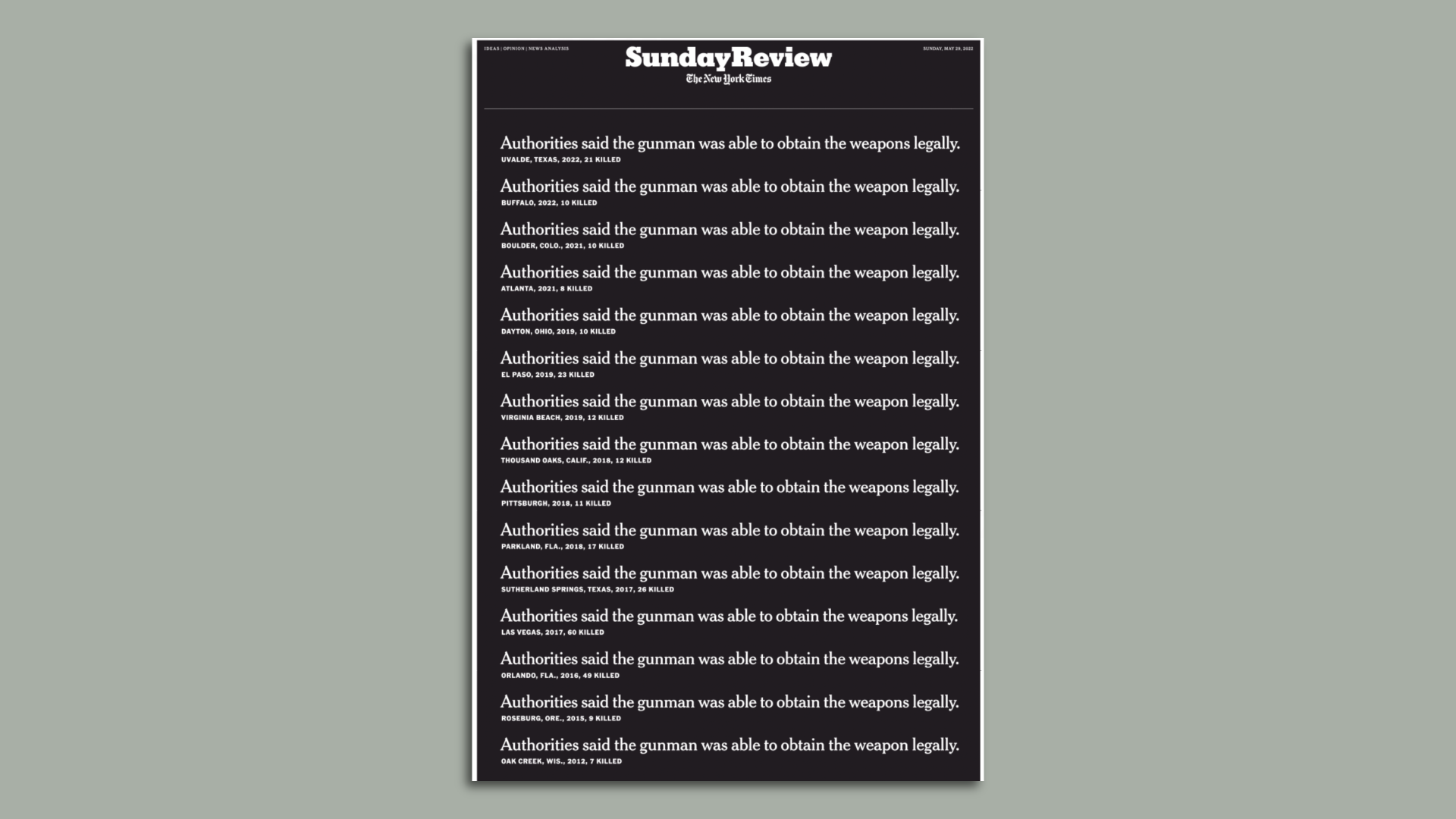| | | | | | | Presented By Bank of America | | | | Axios AM | | By Mike Allen · May 29, 2022 | | 🏖️ Happy Sunday from Miami. Wishing you and yours holiday safety and sanity. - Smart Brevity™ count: 1,190 words ... 4½ mins. Edited by Jennifer Koons.
| | | | | | 🎥 1 big thing: L.A.'s next mayor | | Rep. Karen Bass reacts to businessman Rick Caruso during a mayoral debate at USC in March. Photo: Genaro Molina/L.A. Times via Getty Images Los Angeles is one of America's top Democratic power centers. But with crime up and homelessness out of control, voters there may just be restless enough to embrace a billionaire businessman and longtime former Republican who sits on the Ronald Reagan Presidential Foundation as their next mayor, Axios' Hans Nichols writes. - A crowded June 7 primary ballot has boiled down to a showdown between Rick Caruso and Rep. Karen Bass (D-Calif.). Bass was on President Biden's V.P. shortlist in 2020, and is giving up a safe seat for her shot at running America's second-largest city.
- Mayor Eric Garcetti (D) can't run again because of term limits.
Why it matters: A first-place showing by Caruso would send shockwaves across the Democratic Party — and provide another datapoint that midterm voters in deep-blue places are fed up. - Even a second-place finish would almost certainly keep Caruso in play for the November general election. With a dozen names on the ballot — and some polling putting Bass, 68, and Caruso, 63, neck and neck — neither has a clear path to the 50% needed to avoid a runoff.
- Some Democrats have privately fretted that Caruso could win outright before anyone figures out what's happening. He has spent $37.5 million of his own money. Bass' campaign has raised $3.5 million and received $1.1 million in matching contributions.
The big picture: This year's mayor's race has all the trappings of a Hollywood production: celebrity clashes, big money, drama and nods to past classics. - Jeffrey Katzenberg is backing an independent pro-Bass group spending roughly $1 million in a new campaign with TV ads that liken Caruso to Donald Trump. Caruso has disputed the comparison, accused Katzenberg of lying and tried to get the ads taken down.
Zoom out: The race has echoes of other contests in which Democratic orthodoxy has been upended by dissatisfaction with crime or the economy. - Think Eric Adams' win for New York mayor. Michael Bloomberg. Dick Riordan's time as L.A. mayor for most of the '90s. And the 2002 California recall campaign against Gov. Gray Davis that paved Republican Arnold Schwarzenegger's ascent.
Keep reading. |     | | | | | | 2. 📷 Photo of the week | | Photo: Pete Luna/Uvalde Leader-News via Reuters Pete Luna, general manager of the twice-weekly Uvalde Leader-News, photographed children running to safety after the mass shooting. |     | | | | | | 3. Kristof: Be pragmatic on guns |  | | | Cover: The New York Times | | | | The cover of today's New York Times Sunday Review, from the Opinion section, repeats this sentence 15 times: Authorities said the gunman was able to obtain the weapon legally. - Under each, a different city and toll: Uvalde, 21 killed ... Buffalo, 10 killed ... El Paso, 23 killed ... Las Vegas, 60 killed ... Orlando, 49 killed.
Pragmatic prescription ... Former N.Y. Times columnist Nick Kristof advises "concrete steps, based on nerdy evidence-gathering, based on hard conversations with people we disagree with": - "This will be painful for many of my fellow liberals, but I suggest that we work harder to engage centrists, talk about 'gun safety' rather than 'gun control,' and jump into the weeds."
One example: "The suspects in both the Texas and the Buffalo shootings were only 18," Kristof writes. - "In Wyoming, one of the most pro-gun states in America, the minimum age to buy a handgun is 21. ... If we say that teenagers can't buy a beer, isn't it worth having a conversation about whether they should be able to buy Glock 19 handguns and AR-15-style rifles?"
- Others: Bar "purchases by someone with a recent misdemeanor conviction for drug or alcohol abuse, for violence, or for stalking" ... "allow guns to be removed from someone who is undergoing a mental health crisis or subject to a domestic violence protection order" ... universal background checks to buy a gun.
- Keep reading (subscription).
🔮 The outlook: The N.Y. Times' Jonathan Martin, co-author of "This Will Not Pass," told CNN's "Inside Politics" that incremental gun legislation on Capitol Hill is "more in play than it has been in years." - Go deeper: From Alayna Treene and Axios Sneak Peek, 5 reasons "this time could be different."
See photos from this weekend's NRA convention in Houston. Read a story. |     | | | | | | A message from Bank of America | | Corporate strategies for net zero | | |  | | | | Companies are in a race to net zero, and BofA Global Research analysts say more than nine out of 10 have a clear plan to get there. Get the insights and see how companies are counting net zero as a driver of decision making. Read the report summary. | | | | | | 4. 🇺🇸 Some gave all | | Photo: Stefani Reynolds/AFP via Getty Images A visitor's silhouette on the Vietnam Veterans Memorial during a Memorial Day weekend event. |     | | | | | | 5. 🗳️ Quiz: What ONE STATE has never sent a woman to Congress? | | From left: Sianay Chase Clifford, Molly Gray and Becca Balint. Photos: AP I wouldn't have guessed Vermont, either. - With a rare opening in its congressional delegation, the Green Mountain State is poised to lose its distinction as the only state that has never been represented by a woman in Washington, AP's Wilson Ring reports from Montpelier.
Three women — Lt. Gov. Molly Gray, Senate President Pro Tempore Becca Balint and Sianay Chase Clifford, a social worker and former Capitol Hill aide — are among the Democrats competing in a Aug. 9 primary. It's for a seat being vacated by the state's lone U.S. House member, Democrat Peter Welch, who's trying to move to the Senate. - The two Republican candidates registered to run in the midterm elections are also women.
Between the lines: Given Vermont's liberal reputation, it might seem strange that it would be the last state to send a woman to Congress. - But Vermont's tiny population makes it one of a handful of states with the smallest possible congressional delegation — two senators and one House member.
- And like many states, Vermont has traditionally reelected its incumbents, who have happened to be white men who have ended up serving for extraordinarily long stretches.
Trivia answer: In 2018, Vermont became the last state without female representation in Congress when Mississippi Republican Cindy Hyde-Smith was appointed to the Senate. |     | | | | | | 6. Feds started N.M. inferno | | Satellite image of Hermits Peak wildfire in Las Vegas, N.M., on May 11. Photo: Maxar Technologies via AP Incredibly, it turns out two fires that merged to create the largest wildfire in New Mexico history both started as planned burns set by the U.S. Forest Service as preventive measures. - Gov. Michelle Lujan Grisham said in a statement: "The pain and suffering of New Mexicans caused by the actions of the U.S. Forest Service — an agency that is intended to be a steward of our lands — is unfathomable."
💬 Axios' Russell Contreras, who lives in New Mexico, tells me: The U.S. Forest Service has long been considered an enemy by many in New Mexico, especially Hispanic ranchers who have been here for generations. - Forest Service officials control grazing and water policy, and are the de facto police in rural, isolated areas.
- They also do these burns, which are needed to get rid of brush. But they do it at the wrong times — the Land of Enchantment has been in severe and extreme drought.
Zoom out: The 500-square-mile wildfire has destroyed 330 homes — and displaced thousands of residents from rural villages with Spanish-colonial roots and high poverty rates, while unleashing untold environmental damage. |     | | | | | | 7. ⛽ Vacation nation |  Data: AAA. Map: Baidi Wang/Axios National average for regular: $4.61/gal. |     | | | | | | 8. 🍕 New backyard go-to | | With sky-high prices for ground beef and chicken breasts, more would-be grillers are ordering pizza or cooking pasta instead, Bloomberg reports. 🥊 As part of "shrinkflation," Domino's and Burger King are cutting boneless wings from 10 pieces to eight. |     | | | | | | A message from Bank of America | | Report: the push to net zero | | |  | | | | The Earth is 1.1ºC warmer than the pre-industrial era, and carbon emissions are at unprecedented levels. Net zero efforts aim to address this. A new report from BofA Global Research sheds light on how corporate strategies play into the push to net zero. | | | | 📬 Invite your friends to sign up here to get their daily essentials — Axios AM, PM and Finish Line. |  | It's called Smart Brevity®. Over 200 orgs use it — in a tool called Axios HQ — to drive productivity with clearer workplace communications. | | | |
Post a Comment
0Comments